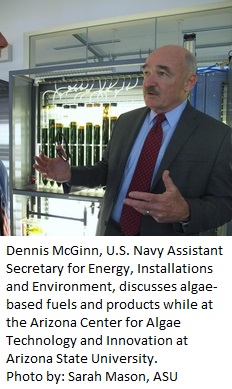 The U.S. Navy is working with Arizona State University to develop biofuels from algae. This article from the school says Dennis McGinn, U.S. Navy Assistant Secretary for Energy, Installations and Environment, visited the school’s Arizona Center for Algae Technology and Innovation (AzCATI) to discuss how the Navy and civilian industry have some key overlapping issues, such as cost, sustainability, efficiency and energy security, and how the Navy wants to work with research institutions and industry to solve these problems for everyone.
The U.S. Navy is working with Arizona State University to develop biofuels from algae. This article from the school says Dennis McGinn, U.S. Navy Assistant Secretary for Energy, Installations and Environment, visited the school’s Arizona Center for Algae Technology and Innovation (AzCATI) to discuss how the Navy and civilian industry have some key overlapping issues, such as cost, sustainability, efficiency and energy security, and how the Navy wants to work with research institutions and industry to solve these problems for everyone.
“We are thinking about energy in three different ways: first in technology terms; biofuels, wind and solar energy storage, power grid systems and more,” McGinn said during a visit to Arizona State University. “But it takes two other critical elements to achieve our energy goals: partnerships and culture. This is why we’re interested in forging and strengthening relationships with outstanding organizations like ASU.”
While the Department of the Navy broadly funds energy research, another key aspect is its considerable influence in setting purchasing standards for their operations. The Navy is using its authority under the Defense Production Act, which allows the Navy, in partnership with the U.S. Department of Energy (DOE) and the U.S. Department of Agriculture (USDA) to invest in industries that are determined critical to national security; in this case, biofuels. McGinn said that the Navy has already invested millions in projects with the DOE and USDA in order to bring down the cost of producing biofuel.
“The Navy wants to buy anywhere between 10 and 50 percent biofuel blends for our ships,” he said. “We want it to be a cost-competitive program. We are working specifically with the USDA to bring down biofuel costs to $3.50 a gallon or less at the commercial scale of 170 million gallons a year by 2016.”
McGinn went on to say that algae biofuels show great potential as an alternative transportation fuel for the nation’s fleets because of their sustainability and scalability.

